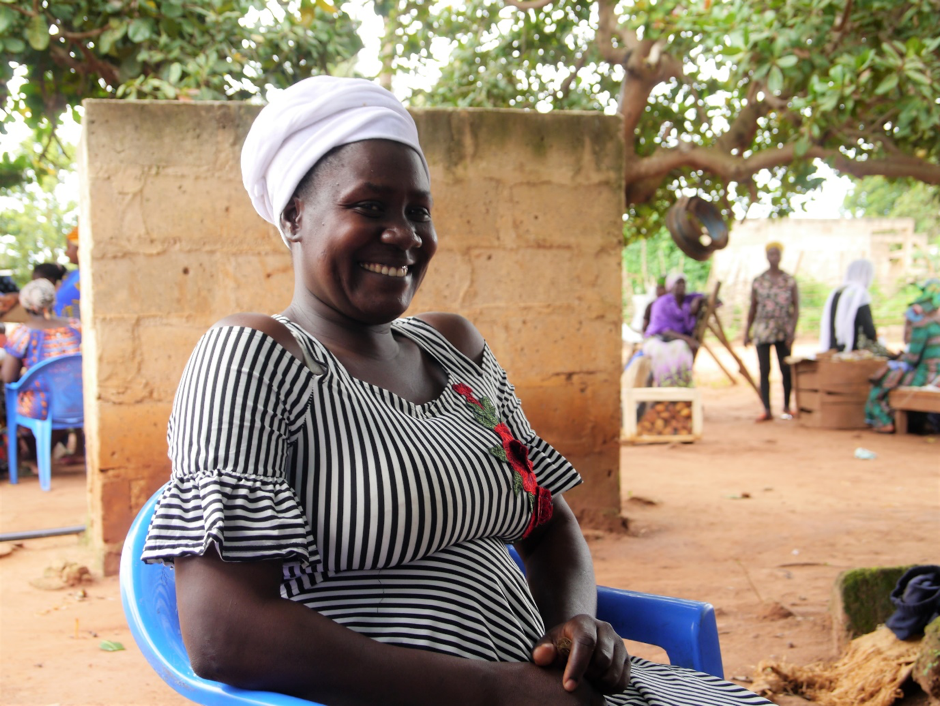For many women in rural Ghana, entrepreneurial ambitions are all too regularly crushed by unequal access to banks and investment. Over the last six years, we’ve been supporting all-female groups to revolutionise their own ability to kick-start enterprise, by setting up Village Savings groups.
Gathered together under an expansive tree, providing much needed shade from the midday heat, a group of around 40 women from four local Village Savings & Loans groups (VSLs) meet for their regular ‘sharing out’ session in Techiman North, Brong Ahafo.
Brong Ahafo is known as the ‘food basket’ of Ghana, and this is clear to see in the lush green landscapes and thriving market places that punctuate each town. Like most of rural Ghana, agriculture is the main source of livelihood here - accounting for 78.9% of rural households in the area.
Despite significant progress towards the Sustainable Development Goals, rural communities still face limited access to quality government services, and barriers to selling their produce in formal markets.
For women, these difficulties are even more apparent.
Step in the Village Savings groups
These enterprising collectives give members a space to pool their resources, support each other to save and take out loans when they need them. The VSL members buy shares in the group and are able to take out loans from 'the pot', which they repay with a small amount of interest.
Four local Village Savings and Loans groups meet for their regular ‘sharing out’ session in Techiman North, Brong Ahafo.
With a self-regulating eye, the groups create an opportunity to achieve financial security that members would otherwise struggle to access.
In addition to groups’ own savings, UP has helped to establish a loan fund for the groups to lend out. The funds are available to the groups at concessionary rates to be repaid to the project at the end of the year. They help to cushion the effects of the seasonal nature of the area’s economic activities and create a more stable funding stream.
Some of these women have been members of savings groups for over four years, while others have joined recently after hearing about the positive impact these groups have on other women’s lives. In this community, UP originally supported the setting up of one savings group. Since then, three further groups have formed organically, receiving ongoing support and training from UP.
Ajara’s story
Ajara, is mother of four with an infectious smile and a great sense of humour. She has been with ‘Salaam alaikum’ (‘Peace be unto you’) VSL for four years and is their secretary.
Before joining the group, Ajara’s casual employment left her family struggling financially, heavily reliant on her husband’s income.
Ajara was a founding member of her VSL and attended training on how to run the group. Through the training, she was able tighten her grasp of financial processes and learn the basics of running a business.
With her membership, Ajara was able to take out a loan that enabled her to send her children to school. Although entry to primary education is free in Ghana there are still costs, including uniforms, books and travel.
Combining her new knowledge of basic enterprise management and the loan, Ajara was also able to move from the tiring job of selling her tomatoes on foot, to setting up a stand to sell her produce.
Since then, she has branched out into selling agrochemicals (like fertilisers), using her training to more effectively record her expenditure, income and profit.
She was pleased to tell us that she is now able to better support her family financially, has more respect from her husband, and feels in control of the money she earns and able to choose what to spend it on.
United Purpose first started working with these women through the ‘Banking for the Poor’ project, funded by the European Commission, which began in 2012. Since 2014, they have been part of our pilot project, ‘Banking for Progress’, funded by Alquity, which aims to contribute to reducing poverty and vulnerability through increased incomes and enhanced livelihoods.







